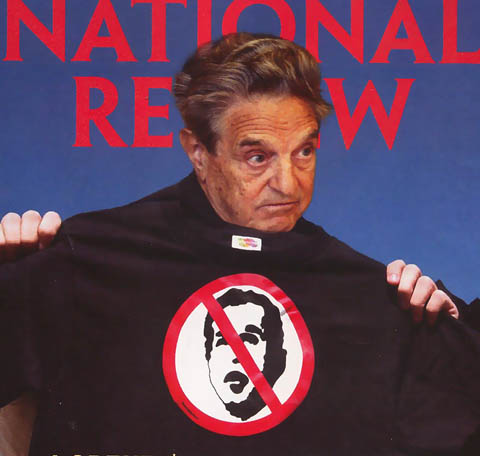George Soros and Bill Browder worry about 2006.
Be afraid. Be very afraid!
by Nelson Schwartz on 27 January 2006 in Fortune
Magazine
Davos,
Switzerland
That's the message from two of the world's most successful investors
on the topic of high oil prices. One of them, Hermitage Capital's
Bill Browder, has outlined six scenarios that could take oil up
to a downright terrifying $262 a barrel.
The other, billionaire investor George Soros, wouldn't make any
specific predictions about prices. But as a legendary commodities
player, it's worth paying heed to the words of the man who once
took on the Bank of England - and won. "I'm very worried about
the supply-demand balance, which is very tight," Soros says.
"U.S. power and influence has declined precipitously because
of Iraq and the war on terror and that creates an incentive for
anyone who wants to make trouble to go ahead and make it."
As an example, Soros pointed to the regime in Iran, which is heading
towards a confrontation with the West over its nuclear power program
and doesn't show any signs of compromising. "Iran is on a collision
course and I have a difficulty seeing how such a collision can be
avoided," he says.
Another emboldened troublemaker is Russian president Vladimir Putin,
Soros said, citing Putin's recent decision to briefly shut the supply
of natural gas to Ukraine. The only bit of optimism Soros could
offer was that the next 12 months would be most dangerous in terms
of any price shocks, because beginning in 2007 he predicts new oil
supplies will come online.
Hermitage's Bill Browder doesn't yet have the stature of George
Soros. But his $4 billion Moscow-based Hermitage fund rose 81.5
percent last year and is up a whopping 1780 percent since its inception
a decade ago. A veteran of Salomon Bros. and Boston Consulting Group,
the 41-year old Browder has been especially successful because of
his contrarian take; for example, he continued to invest in Russia
when others fled following the Kremlin's assault on Yukos.
Doomsdays 1 through 6
To come up with some likely scenarios in the event of an international
crisis, his team performed what's known as a regression analysis,
extrapolating the numbers from past oil shocks and then using them
to calculate what might happen when the supply from an oil-producing
country was cut off in six different situations. The fall of the
House of Saud seems the most far-fetched of the six possibilities,
and it's the one that generates that $262 a barrel.
More realistic -- and therefore more chilling -- would be the scenario
where Iran declares an oil embargo a la OPEC in 1973, which Browder
thinks could cause oil to double to $131 a barrel. Other outcomes
include an embargo by Venezuelan strongman Hugo Chavez ($111 a barrel),
civil war in Nigeria ($98 a barrel), unrest and violence in Algeria
($79 a barrel) and major attacks on infrastructure by the insurgency
in Iraq ($88 a barrel).
Regressions analysis may be mathematical but it's an art, not a
science. And some of these scenarios are quite dubious, like Venezuela
shutting the spigot.
Energy chiefs at the World Economic Forum in Davos downplayed the
likelihood of a serious oil shortage. In a statement Friday, Shell's
CEO Jeroen Van der Veer declared, "There is no reason for pessimism."
OPEC Acting Secretary General Mohammed Barkindo said "OPEC
will step in at any time there is a shortage in the market."
But then no one in the industry, including Van der Veer, foresaw
an extended run of $65 oil -- or even $55 oil -- like we've been
having.
It's clear that there is very, very little wiggle room, and that
most consumers, including those in the United States, have acceded
so far to the new reality of $60 or even $70 oil. And as Soros points
out, the White House has its hands full in Iraq and elsewhere.
Although there are long-term answers like ethanol, what's needed
is a crash conservation effort in the United States. This doesn't
have to be command-and-control style. Moral suasion counts for a
lot, and if the president suggested staying home with family every
other Sunday or otherwise cutting back on unnecessary drives, he
could please the family values crowd while also changing the psychology
of the oil market by showing that the U.S. government is serious
about easing any potential bottlenecks.
Similarly, he could finally get the government to tighten fuel-efficiency
standards and encourage both Detroit and drivers to end decades
of steadily increasing gas consumption. These kinds of steps would
create a little headroom until new supplies do become available
or threats like Iran's current leadership or the Iraqi insurgency
fade.
It's been done it before. For all the cracks about Jimmy Carter
in a cardigan and his malaise speech, America did reduce its use
of oil following the price shocks of the 1970s, and laid the groundwork
for low energy prices in the 1980s and 1990s. But it would require
spending political capital, and offending traditional White House
allies, and that's something this president doesn't seem to want
to do.
|
